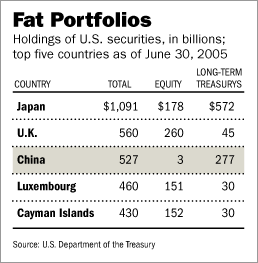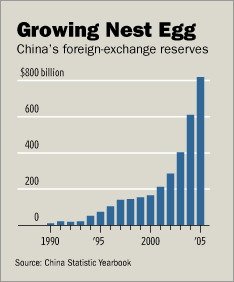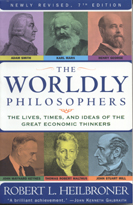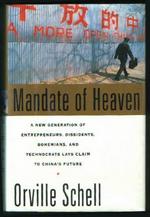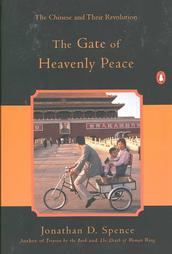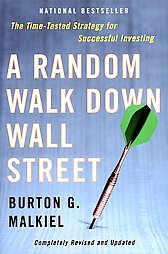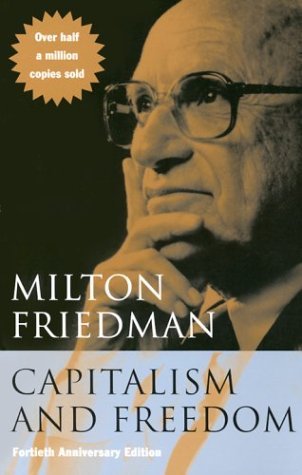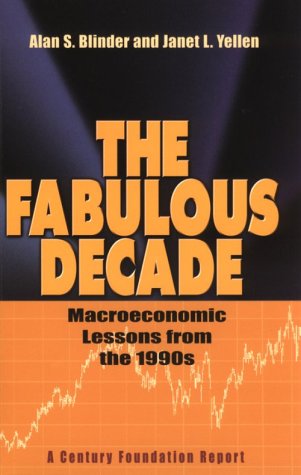Additional Reading on China’s Foreign Exchange Reserves
Following the preview post on China’s foreign exchange reserves, here is a comprehensive story on how China’s financial policy will shake the world economy.
From the Wall Street Journal By Andrew Browne
China’s Reserves Near Milestone, Underscoring Its Financial Clout
Sometime in the next few days, China’s holdings of foreign currencies and securities will top $1 trillion — a sum greater than the annual economic output of all but nine countries. The rapid growth in these so-called foreign-exchange reserves has made Beijing a colossus in the financial world, cushioned against shocks at home, but potentially able to trigger them abroad.
How China manages its growing pool of wealth has major repercussions for the global economy. Beijing’s reserves totaled $987.9 billion as of Sept. 30 and are growing by roughly $20 billion a month. That total compares with the about $1.2 trillion in assets under management at U.S. mutual-fund giant Fidelity Investments.
As the pot grows, the secretive and sophisticated portfolio managers at China’s central bank are trying gradually to boost their country’s returns on its foreign-exchange holdings, at least in part by making somewhat riskier but higher-yielding investments. Last spring, an unsuccessful effort to divine their intentions sparked a steep run-up in the price of gold.
For the U.S., how China deploys its reserves is a question of some consequence. Most of China’s currency reserves are invested in U.S.-dollar-denominated debt, such as U.S. Treasurys, which are considered the world’s safest investment. That has kept demand for U.S. Treasury notes high — and interest rates low. A change in that pattern could affect how much Americans pay for mortgage loans and other borrowings. Read the rest of this entry »
Two Chicago Derivative Exchanges to Merge
The Chicago Mercantile Exchange and the Chicago Board of Trade is to merge in an $8 billion deal. The merger of the two longtime competitors will create the largest derivative market in the world
The new exchange, to be named CME Group, will have an average daily trading volume of about 9 million contracts, representing $4.2 trillion, much larger than the New York Stock Exchange’s $87.2 billion daily trading value.
The merger signaled the rising position of Chicago as the world finance center. It also marked a milestone on the track of market integration.
From the New York Times:
Two Exchanges in Chicago Will Merge
By Alexei Barrionuevo
The Chicago Mercantile Exchange and the Chicago Board of Trade, longtime fierce competitors, said Tuesday that they would merge in an $8 billion deal creating the largest market for financial derivatives contracts in the world.
The transaction would be the latest in a wave of mergers among the leading financial exchanges, as they transform themselves from member-owned clubs to for-profit companies competing in markets that have become increasingly global and electronic.
The New York Stock Exchange, the Nasdaq Stock Market and smaller exchanges have announced mergers, and the New York exchange’s recent pursuit of Euronext, operator of four European stock markets, is driven in large part by Euronext’s derivatives exchange in London.
A combination of the two Chicago markets, which were founded in the 19th century to trade agricultural futures, would trumpet the spectacular rise of derivatives — financial contracts whose value is tied to or derived from currencies, interest rates, commodities or other things of value.
Derivatives have made risk more manageable for many businesses, including oil companies seeking to insure themselves against storms and banks trying to protect themselves against home mortgage defaults. Yet they have also fueled trading blow-ups, as in the near-collapse in 1998 of the hedge fund Long-Term Capital Management that shook the financial markets. Read the rest of this entry »
Wilshire, Dow Jones to Launch a New Group of Global Indexes
Good news for index funds and those investing in global markets. The new global indexes Wilshire and Dow Jones are cobbling are to meet needs from more and more investors who are increasingly eyeing emerging markets as havens to hedge their portfolios and, if possible, to collect more returns.
The new Dow Jones Wilshire Global Total Market Index, including more than 12,000 stocks in 56 countries and a float-adjusted market value of $33.6 trillion, will beat other two global indexes on capital value: MSCI All-Country World Index, which covers 2,772 stocks in 48 markets with a market value of $27.4 trillion, and the S&P Citigroup Global Equity Indices, which covers 10,446 stocks in 56 countries with a market value of $33 trillion.
From the Wall Street Journal
Wilshire, Dow Jones to Launch a New Group of Global Indexes
By Karen Richardson
With investors continuing to chase returns in global markets, companies that build stock indexes are ramping up their offerings.
In the latest instance, Wilshire Associates Inc., which compiles the DJ Wilshire 5000 Composite index, and Dow Jones Indexes, which compiles the Dow Jones Industrial Average, are teaming up to launch a new group of global indexes, in a bid to compete for business from international money managers who are the prime users of tools like these. Dow Jones & Co. is the publisher of The Wall Street Journal.
Several rival index providers are also rolling out new products, or making changes in their lineups. Next month, Standard & Poor’s Corp. plans to launch “growth and value” style indexes for emerging markets, which would enable investors to track the performance of companies in developing countries that fall into the categories of growth or value stocks. This month, S&P also started providing more historical performance and customized data for each country in its S&P Citigroup Global Indices, according to David Blitzer, managing director and chairman of S&P’s index committee. Read the rest of this entry »
The Fake Exuberance
By a $19.1 billion IPO, Industrial & Commercial Bank of China is going to break the world IPO record made by NTT 8 years ago. This is just another stunning miracle among China’s recent IPO crazes.
China’s stock market is one of the best performer this year in Asia. At the same time, it’s also one of the worst regulated and the most manipulated.
One of the driving forces behind the recent surge is the floating of the state-owned shares, which were originally held by governments and were later forced to circulate on the market to make listed companies real public companies. This is a significant step China has taken to correct its distorted equity market.
So far the whole floating reform has been ostensively successful. But behind it is another round of manipulation and false exuberance. Market manipulators took advantage of the big news to push up stock prices. They can’t hold the prices at high level permanently. Their purpose is to sell stocks to some fools who bet on a further hike. That’s not going to happen though. And when the manipulators start to sell, the market will collapse.
Companies are exploiting the transitory zest to sell their shares at high prices and to collect large amounts of cash. Someday, someone will suffer badly from this furor. Saddled with endless scandals and bottomless bad debt, China’s state owned banks are just simply not worth to invest in.
From Bloomberg News
ICBC Seeks as Much as $19.1 Billion in Biggest IPO (Update1)
By Cathy Chan
Oct. 8 (Bloomberg) — Industrial & Commercial Bank of China Ltd., the nation’s biggest by assets, plans to raise as much as $19.1 billion in the world’s largest initial public offering, four people involved in the sale said.
Beijing-based ICBC plans to offer 35.4 billion shares at HK$2.56 to HK$3.07 apiece, said the people, who declined to be identified before an announcement from the bank. The Beijing- based company also may sell 13 billion shares at 2.6 yuan to 3.12 yuan each in Shanghai, they said. The top end of the range is subject to final discussion, the people said.
The IPO probably will exceed the $18.4 billion that Japan’s NTT DoCoMo Inc. raised in 1998. Chinese banks, including China Merchants Bank Co. and China Construction Bank Corp., have attracted $27.7 billion from share sales in the past 15 months. Shares of Shanghai-based Bank of Communications Co. more than doubled since its IPO in June 2005.
“People buy Chinese banks because they’re optimistic about the wider economy, not because they have any individual allure,” said Pauline Dan, who helps manage $1.5 billion at Manulife Asset Management in Hong Kong.
The initial price range of ICBC represents between 1.95 times and 2.23 times its 2006 book value, the people said. Bank of Communications, by contrast, trades at 2.32 times its 2006 book value and Construction Bank is trading at 2.49 times.
Pushing Banks
The government has been pushing banks to tighten lending controls to escape a legacy of corruption that saddled the industry with $262 billion of bad debt as of March 2004. Bad loans represented 4.1 percent of ICBC’s total in June, down from 4.7 percent at the end of last year. China Banking Regulatory Commission said the country’s five biggest banks should cut bad loans to less than 5 percent.
ICBC’s simultaneous offerings in Hong Kong and China will eclipse the $13.7 billion that Bank of China raised in two sales in May and July this year. The bank’s stock is scheduled to start trading in Hong Kong and Shanghai on Oct. 27.
The bank last year received a $15 billion bailout from the government that helped it reduce bad loans, and this year sold a 10 percent stake for $3.78 billion to a group including Goldman Sachs Group Inc.’s GS Capital Partners V fund, Allianz AG and American Express Co.
Merrill Lynch & Co., China International Capital Corp., Credit Suisse Group, Deutsche Bank AG and ICEA Securities are handling the global share offering. Underwriters for the domestic sale are China International Capital Corp., Citic Securities Co., Guotai Junan Securities Co. and Shenyin & Wanguo Securities Co.
ICBC Earnings
ICBC may earn 55.2 billion yuan ($6.9 billion) in 2006, up 47 percent from a year earlier, based on international accounting standards, according to analysts estimates from Deutsche Bank.
The following is a table of the 10 largest global IPOs, according to data compiled by Dealogic and Bloomberg. The list excludes rights offerings, domestic sales and tenders. The size is taken from exchange rates at the time of the sale and includes over-allotment options that were exercised.
Company Country Year Size
($bln)
NTT DoCoMo Japan 1998 18.4
Enel SpA Italy 1999 17.0
Deutsche Telekom AG Germany 1996 13.0
Bank of China Ltd. China 2006 11.2
OAO Rosneft Russia 2006 10.6
AT&T Wireless U.S. 2000 10.6
Telstra Corp. Australia 1997 10.0
China Construction Bank Corp. China 2005 9.2
Kraft Foods Inc. U.S. 2001 8.7
Telia AB Sweden 2000 8.6
Morgan Stanley Becomes the First Foreign Bank Doing Renminbi Business in China
Morgan Stanley will become the first foreign bank being allowed to do renminbi business in China, Financial Times reported.
In order to protect local banks from foreign banks, which are usually much more competitive and market-oriented, Chinese monetary authorities banned foreign banks from offering renminbi-denominated products.
Morgan Stanley will be qualified to apply for a license of renminbi business after it acquired Nan Tung Bank, one of the few Chinese banks open to foreign ownership, the newspaper said.
Click HERE to read the news story.
Morgan Stanley is on Monday expected to announce that it has obtained a coveted Chinese commercial banking licence, a surprise move that trumps its US investment bank rivals.
The licence will pave the way for it to offer renminbi-denominated products to corporations operating on the mainland. Typically, overseas banks have to operate for at least five years on the mainland, clear tough regulatory hurdles and obtain a commercial banking licence before being able to apply to conduct business in local currency.
One More Reason Why Taiwan Outpaces Mainland
The Wall Street Journal reported that Taiwan is Seeking to lure more foreign funds to its stock and bond markets. This news comes in sharp contrast with mainland China’s new policy on banning foreign firms to acquire domestic stockbrokers. (Also please refer to this post).
This is just one more reason why Taiwan’s economy outpaced mainland’s.
From the Wall Street Journal
Taiwan’s cabinet approved a three-year plan to make the island’s stock and bond markets more attractive to foreign investors, allowing the sale of government stakes in some financial institutions and planning a review of taxes on financial products.
Among the project’s eight goals are a reduction in government holdings of financial assets and an increase in foreign and institutional ownership of local companies. Cabinet spokesman Cheng Wen-tsang said the plan doesn’t require legislative approval.
The government hopes to raise the value of financial services as a percentage of gross domestic product to 11.29% by 2009 from 10.86% this year, said Vincent Tsai, a section chief at the Financial Supervisory Commission.
The cabinet said the government will dispose of its stakes in second-tier financial institutions and will continue to lower its holdings of financial assets. It didn’t identify the institutions or provide other details. It owns between 50% and 60% of the island’s financial sector. (more)
China’s New Interbank Rates
This might not be a coincidence that China’s central bank announced a new interest policy when the US Treasury Secretary Henry Paulson is paying a visit to China. A flexible yuan rate, which is what Paulson aimed for, calls for a healthy, market-oriented financial market. And the Shanghai Interbank Offered Rate, or Shibor, is the latest step China is taking to cobble the entangled credit market.
China won’t leave its exchange rate fully flexible until a sustainable financial system is established. Shibor is a small step. Some are suspicious about it’s real effect, but at least China’s banking regulators are summoning up strength.
(The news was reported by the Wall Street Journal. Officials declined to comment)
The yuan dichotomy
For the first time, Chinese central bank governor and the banking regulatory leader clearly signaled the appreciation of yuan. Zhou Xiaochuan, the central bank governor, said more flexibility will be introduced to yuan. Zhou made his comments in Singapore on Monday, the same day when he had a dinner with Henry Paulson, the newly-elected U.S. Treasury Secretary. After Zhou, Liu Mingkang, the banking regulatory leader, said Chinese banks must be prepared to hedge their currency risks.
American economists and businessmen have been predicting the appreciation of yuan for a long time, but they always missed one key point, that the yuan rate is not an economic problem, it’s political. Almost everyone in China, be them politicians or economists, will agree with an exchange rate reform. The only concern is how much social and political percussion will follow.
Economically, raising the yuan rate at least can save China from the monetary policy dilemma. China has been deliberately maintaining an interest rate gap with the US dollar in the hope of fending off short-term speculators who can’t afford the large opportunity cost of investing in yuan when its interest rates are much lower than US dollar’s. This failed to stop the inflow of hot money. China then has to counterbalance the monetary market by purchasing US dollars. By doing this China risks a round of inflation and an abnormal high volume of foreign exchange (almost $1 trillion). Stacking huge amount of foreign exchange is a tremendous waste of resources.
On the other hand, the economy, with the growth rate reaching a more than 15 years record in the second quarter, has increasingly seen an overheating. Exports, which accelerate the stock of foreign exchange, account too much to the economy. Risk of inflation is haunting.
The economic authorities have been fighting the awkward situation with few efficacy. Although they knew the root solution is the appreciation of the yuan, they constantly shied away from it.
The upsides of an appreciation are obvious. It will discourage exports, balance the monetary market, enable the central bank to raise interest rates, and silence those countries who have been disgruntled by China’s so-called exchange rate manipulation. But the drawbacks are what the authorities are more reluctant to see. It may slow the economy, increase unemployment, create social instability, and put its feeble financial system in a more dangerous situation.
It’s a dichotomy, but someday, someone has to do something.
The Merger of China’s A and B Shares
China’s B shares went unusually ballistic today. Then there is news that Shanghai Stock Exchange is maneuvering to merge B and A shares. The whole capital value of B shares are only about $10 billion, less than 10 percent of A shares’. A single medium-scale investor is able to buy the whole B market, which is denominated in USD and was designed particularly for foreign investers. For foreign investors, most times B shares are just reluctant alternatives and last resorts. They will first consider to invest on property markets. As new investment channels, such as QFII, become more and more available, it’s inevitable that B shares will be disfavored. A merger might be the only exit for the B market.
If we don’t forget that Chinese financial authorities have already kicked off an unprecedented conversion of $200 billion non-tradable equity into tradable A shares, we will be confident that China is painstakingly redoing the equity market in line with the international standard. The transformation created a new golden opportunity for those privileged to take advantage of.
China Merchants Bank $2.4 billion IPO
Last Friday China Merchants Bank, the most profitable bank in China, sold it’s shares in Hong Kong Stock Exchange. China Merchants is the second mainland bank being listed in Hong Kong this year. Despite Bank of China’s $11.2 billion record IPO in June, China Merchants boasts the highest return on equity among the country’s biggest banks. Its earnings surged at an annual speed of 40 percent from 2000 to 2005. The performace obviously eclipses Bank of China, and ICBC, which is planning a HK-mainland dual list this year.
China Construction Bank was just included on Hang Seng Index. Agriculture Bank is the only incurable one among the big four that is seemingly forgotten by the authority.
